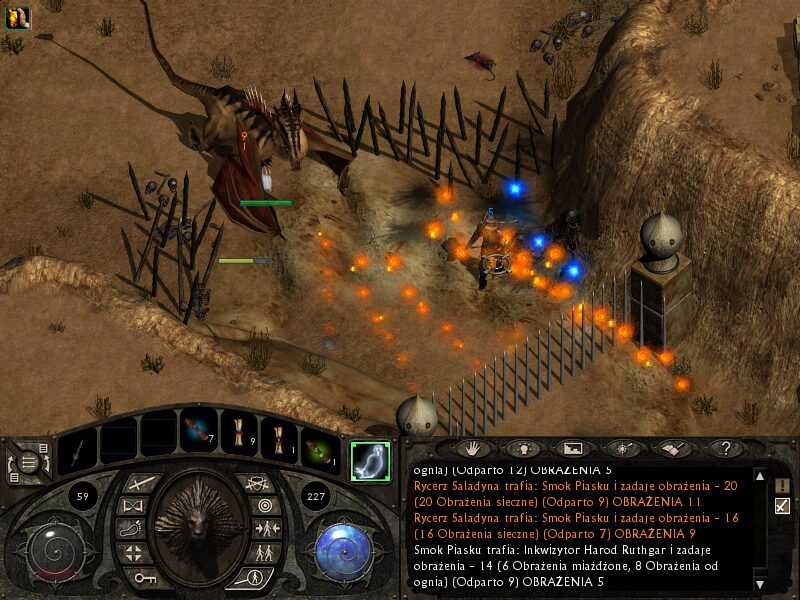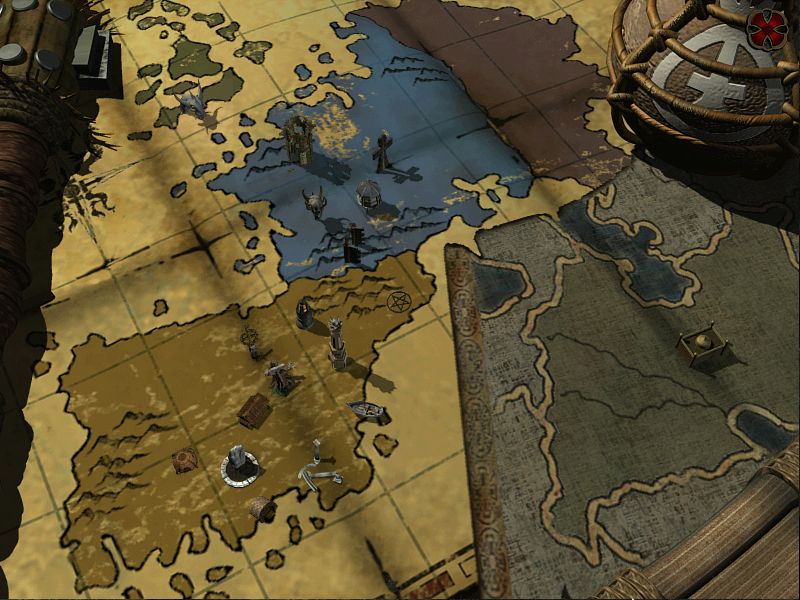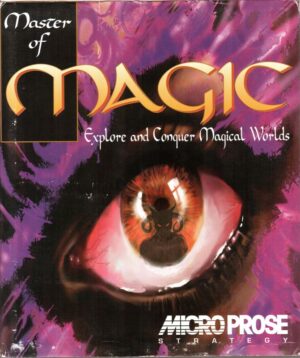Retro Replay Review
Gameplay
Lionheart: Legacy of the Crusader delivers a rich role-playing experience by blending the familiar S.P.E.C.I.A.L. system from Fallout with a robust magic framework. As you carve out your character’s destiny—choosing from Human Pureblood, Demokin, Feralkin, or Sylvant—you’ll find that every attribute point and perk can dramatically shift the way you approach quests. Whether you pump points into Charisma to talk your way past guards or invest heavily in Magic to unleash devastating elemental spells, the game rewards experimentation.
(HEY YOU!! We hope you enjoy! We try not to run ads. So basically, this is a very expensive hobby running this site. Please consider joining us for updates, forums, and more. Network w/ us to make some cash or friends while retro gaming, and you can win some free retro games for posting. Okay, carry on 👍)
The first half of Lionheart leans heavily into exploration and free-form questing within and around Barcelona. Factions abound, each with its own agenda, and you can ally with merchants, thieves, or religious orders to unlock unique story threads. Diplomacy, stealth, thievery, and brute force all have viable applications, and many objectives can be solved in more than one way. This open-ended structure gives you a genuine sense of authorship over your character’s path.
Mid-game, the focus shifts toward more intense combat scenarios as the dimensional rift’s horrors spill into our world. The action-based combat system harkens back to Diablo—rapid clicking, area-of-effect spells, and real-time dodges—but is enriched by your character’s SPECIAL stats. A tanky Feralkin can wade into melee while a glass-cannon Demokin melts enemies from afar. Companions join you dynamically, each controlled by AI with strengths and weaknesses that complement your playstyle.
That said, the combat can feel repetitive by the final act. Enemy types tend to recycle, and the pace sometimes bogs down under waves of lesser demons. Still, the variety of magic schools—fire, ice, necromancy, and more—keeps encounters fresh, especially when you combine spells with potions, scrolls, and gear enhancements. A well-tuned build can turn seemingly insurmountable hordes into a display of arcane fireworks.
Graphics
Released in the early 2000s, Lionheart’s visuals reflect the era’s isometric RPG style. The environments are hand-painted backdrops rich in detail: cobblestone streets of Barcelona, candlelit taverns, and sand-scorched desert ruins feel distinct and cohesive. Character sprites are well-animated, especially during spellcasting sequences where runes and particle effects swirl around the hero’s hands.
On the downside, the game’s engine can struggle with high enemy counts on screen, resulting in occasional frame drops during large battles. Texture resolutions are modest by today’s standards, so close-up views can appear blocky. However, these graphical limitations are often offset by strong art direction—each region has its own color palette and architectural motifs, from Moorish arches to Gothic cathedrals.
Lighting plays a significant role in setting the atmosphere. Dungeon corridors glow with magical braziers, while outdoor sequences transition smoothly from warm sunset hues to starry nights. Spell effects are vibrant enough to stand out against darker backdrops, making you feel truly powerful as you unleash lightning storms or summon phantom wolves. Region-specific weather also enhances immersion, whether it’s a sudden rainstorm in France or a dust-laden breeze in the Middle East.
Story
Lionheart weaves an ambitious narrative that spans centuries. The inciting incident—a mystical ritual triggered by King Richard the Lionheart’s massacre at Acre—teases a dark legacy that reverberates four hundred years later. You begin as a lowly slave in Barcelona, only to discover your bloodline ties you directly to the infamous king. This revelation upends your life and thrusts you into a struggle for humanity’s fate.
Historical figures such as William Shakespeare and Galileo Galilei make cameo appearances, cleverly reimagined to fit a world where magic and science coexist. Shakespeare pops up as a roguish playwright-spy with cutting wit, while Galileo’s telescopes conceal arcane runes. These interactions lend authenticity to the alternate-history setting and inject moments of humor and wonder into the unfolding calamity.
Dialogue is generally well-written, with choices that can alter character allegiances and unlock hidden side quests. You can choose to embrace your demonic heritage as a Demokin or cling to human ideals—each path reveals unique lore and moral quandaries. Although the central plot occasionally dips into familiar “chosen one” tropes, the richly realized world and branching outcomes keep the narrative engaging.
Overall Experience
Lionheart: Legacy of the Crusader is a standout for fans of classic isometric RPGs who crave deep character customization and a rich alternate-history setting. Its fusion of Fallout’s SPECIAL system with an extensive magic paradigm offers a level of freedom rarely seen in genre contemporaries. The sprawling questlines and factional politics in Barcelona alone could occupy dozens of play hours before the rift’s demons even arrive.
However, the game isn’t without rough edges. Combat can grow repetitive in the later stages, and the aging engine sometimes shows performance hiccups. Minor dialogue glitches and AI quirks from your companions can break immersion, though these issues are generally outweighed by the game’s ambitious scope and narrative depth.
Ultimately, if you appreciate a world where history is reshaped by sorcery, deep RPG mechanics, and non-linear storytelling, Lionheart delivers a memorable adventure. While it may lack the polish of modern titles, its robust character builds, engaging plot twists, and atmospheric locales make it a worthy addition to any RPG enthusiast’s library.
 Retro Replay Retro Replay gaming reviews, news, emulation, geek stuff and more!
Retro Replay Retro Replay gaming reviews, news, emulation, geek stuff and more!









Reviews
There are no reviews yet.